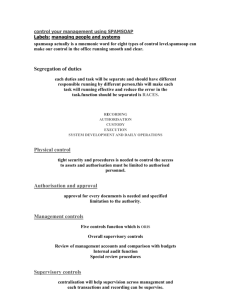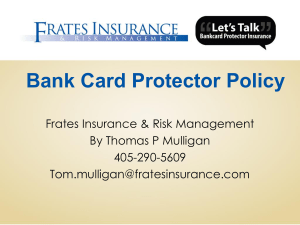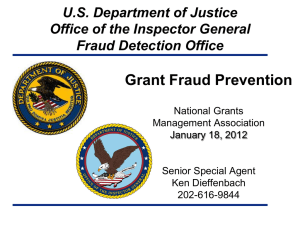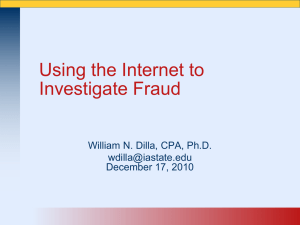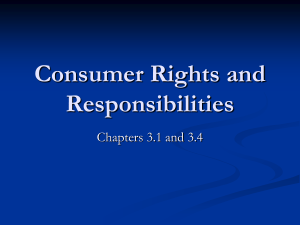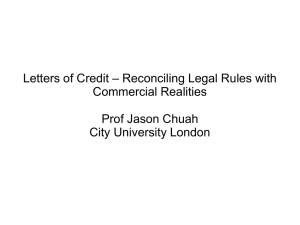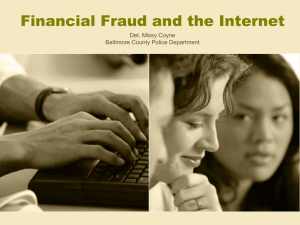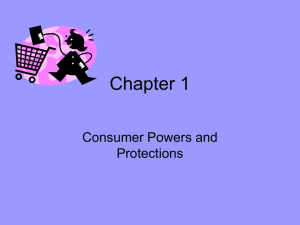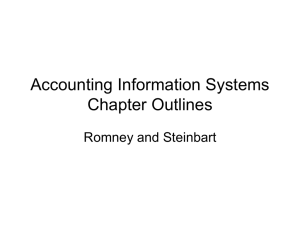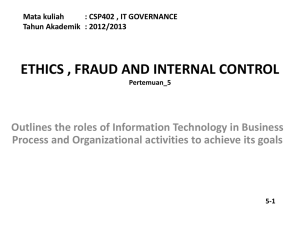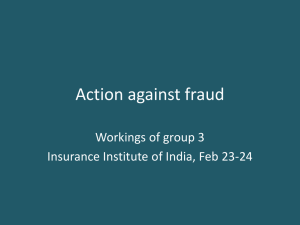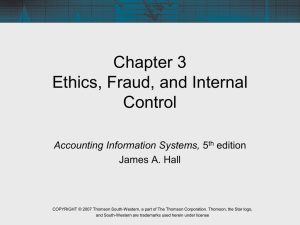Fraud & Ethics Training
advertisement
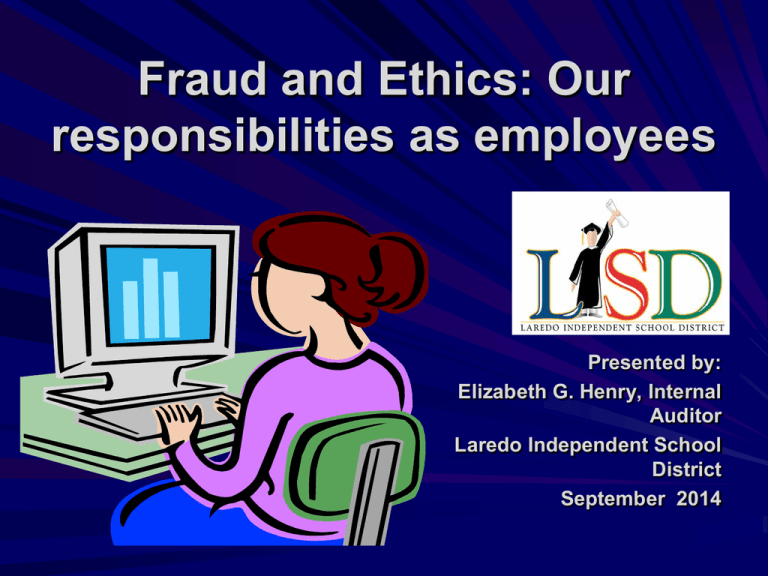
Fraud and Ethics: Our responsibilities as employees Presented by: Elizabeth G. Henry, Internal Auditor Laredo Independent School District September 2014 What is Fraud? -the intentional false representation or concealment of a material fact for the purpose of inducing another to act upon it to his or her injury. CFC (Local) Accounting Audits Occupational fraud- the use of one’s occupation for personal enrichment through the deliberate misuse or misapplication of the employing organization’s resources or assets* (Association of Certified Fraud Examiners) *2008 Report to the Nation on Occupational Fraud and Abuse. Copyright 2008 by the Association of Certified Fraud Examiners Inc. Fraud Triangle Opportunity Incentive/ Pressure Rationalization Opportunity Unethical tone at the top Lack of supervision Knowledge of weak controls Ineffective controls Belief “won’t get caught” Incentive/Pressure Desire for status symbols—house, car, vacations, etc. Unusually high personal debt (gifts, etc.) Excessive gambling habit (football “pots”) Alcohol or drug problems Undue family or peer pressure to succeed Pressure placed on employees and/or administration/directors to perform Rationalization Employee feels the district owes them; therefore they compensate themselves Feeling of insufficient job recognition for their performance Personal need for more money Employee’s way of rewarding themselves (“I deserve it!) Employee feels he/she is doing more than what they get paid for (Need to get something back) What makes us vulnerable? Lack of segregation of duties (have control of everything) Insufficient funds for program implementation Poor school management supervision (Who’s responsible?) Lack of internal controls Untrained personnel Management’s thinking “he/she wouldn’t do that” (Trusting) Examples of Fraud Manipulation of collections of district accounts Unauthorized use of funds/credit cards Alteration/falsification/destruction of documentation and/or school records and/or student records “Borrowing” district funds and/or any district assets Taking copy paper, pencils, etc. home Some “Red Flags” in School Accounts Altered/missing documentation Untimely deposits Diverting receipts Fictitious vendors Non-compliance with established policies, procedures, and regulations Incomplete reports and/or missing information Observations over the years Questionable Conflict of Interests Negligence in the maintenance of school funds Improper accountability of district monies Inadequate employee record maintenance (time worked) Circumventing of district procedures Campus bookkeeper took close to $19,000 in C & SA funds …continued Alteration of student records Cheerleading Sponsor(s) have left the campuses indebted to vendors with Principal authorization Unauthorized editing of employee’s time Campus held fundraiser during the school day and deposited the monies in the PTO account …continued District employee performing “non-district duties” during district time Secretary altered daughter’s time cardsreflecting at times as though she was working when in reality she was not “Borrowing” of student monies Fraud consequences in Administrative functions Lack of segregation of duties (Who’s responsible for what?) Opportunity to utilize system weaknessessystem overrides Untrained personnel- unfamiliar with requirements Lack of internal controls Inappropriate access (Too much control?) Be aware and stay alert Know the “Red Flags” of fraud in your area of responsibility Be familiar with the types of fraud TAKE CHARGE—Be Responsible and Ethical employees Steps for Prevention Management sets the toneEstablishes the ground rules Conduct a Review of: Overall Campus or Department internal controls-ask yourselfhow strong are they? Ensure there is an adequate segregation of duties Provide or secure adequate training Enforce district policies and procedures SUPERVISE! MONITOR! Board Policies Follow up and familiarize yourself with the following: CAA (Local) Fiscal Management Goals and Objectives Financial Ethics CFC (Local/Legal ) Account Audits; DH (Local/Legal) Employee Standards of Conduct; DH (Exhibit) Employee Standards of Conduct DH ( Regulation) Code of Ethics and Standards of Conduct Fraud Policy “All employees are responsible for the detection and prevention of fraud, misappropriation, and other irregularities. Each administrator shall be familiar with the types of improprieties that might occur within his or her area of responsibility, and be alert for any indication of irregularity.” CFC (Local) Accounting Audits Fraud Adds Up---Responsibility As employees, we are responsible for our job responsibilities and actions As Campus Principals, you are responsible for all that takes place at your campus As Directors, you are responsible for all that takes place at your department(s) Be aware of what is happening at your campus/department So what if I commit fraud? “If an employee is found to have committed fraud or financial impropriety, the Superintendent or designee shall take or recommend appropriate disciplinary action, which may include termination of employment.” CAA (Local) Fiscal Management Goals and Objectives Financial Ethics Keep in mind It is not possible to cover all potential situations as no set of rules and procedures will ever include such, therefore, the District must rely upon the good faith, good judgment and high moral standards of its employees as their main principle guide to ethical conduct. As public servants, this is expected from our taxpayers. Acknowledgement Z I acknowledge that I, as an employee of the Laredo Independent School District have read and understood this presentation as well as, all related Fraud and Ethics related policies addressed and referenced. As a district employee, I will comply with such. Thank You If you have any questions, feel free to contact the Internal Audit Department Elizabeth G. Henry, Internal Auditor ehenry@laredoisd.org 3006 Hendricks St. 956-273-1460
